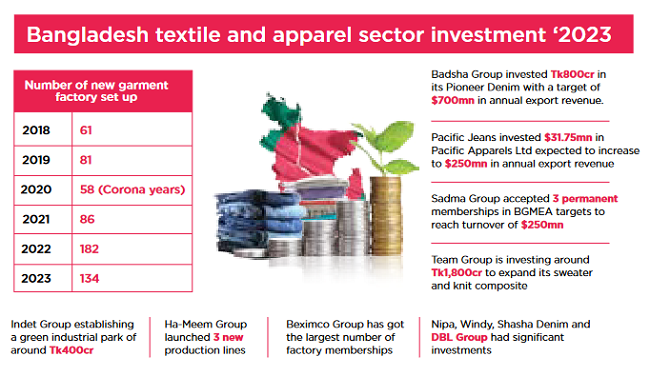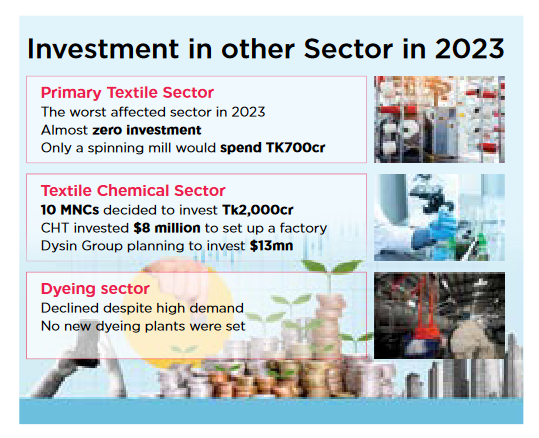The year 2023 ended with many political and economic ups and downs. All over the world, especially in the big markets of Bangladesh’s garment industry, Europe and America, where about 70 percent of apparel are exported, there has been an economic slowdown. Despite the global recession, there is a big investment in Bangladesh’s garment industry in 2023.

Bangladeshi entrepreneurs stepped up to set up around 134 new ready-made garment factories last year to tap the growing potential of the garment sector. Most of these factories are expected to start production within this year.
According to Bangladesh Garments Manufacturers and Exporters Association (BGMEA) membership data, Badsha Group of Industries, Pacific Jeans Group, Ha-Meem Group, Sadma Group and Beximco have invested in 2023 to diversify their exportable garments.
Of this, Badsha Group has invested Tk 800 crore in its Pioneer Denim at Madhavpur in Habiganj to set up a state-of-the-art unit with a target of $700 million in annual export revenue. Large scale production will start in 2024 where at least 15 thousand people will be employed in this factory. Currently the group has created employment for around 25 thousand people.
Pacific Jeans has also invested $31.75 million in Pacific Apparels Limited in Chittagong EPZ. The new factory will manufacture luxury garments such as suits, blazers, jackets, coats, pants and casualwear. It is expected that this new unit will create employment opportunities for 9 thousand people in the next three years. Once fully operational, exports from here are expected to increase to $250 million.
Focusing on diversification rather than increasing garment capacity, Ha-Meem Group launched three new production lines in April 2023 with plans to expand to 16 lines. According to BGMEA President Faruque Hassan, in the last two years, Beximco Group has got the largest number of factory memberships.
In 2023, Sadma Group has accepted three permanent memberships in BGMEA. The group’s knit composite Appropriate Apparel will employ 3,000 people and Mouchak Apparel will employ another 2,000. By 2024, the group’s total workforce will be 18,000 and with current $100 million turnover the group targets to reach turnover of $250 million.

Indet Group is establishing a green industrial park with an investment of around Tk 400 crore. The industrial park is expected to be operational by June 2024. The park will be a comprehensive source of accessories and packaging in the same arena.
Team Group is investing around Tk 1,800 crore to expand its sweater and knit composite manufacturing capacity and set up new facilities including a denim garment unit, a zero discharge washing plant and an outerwear factory with accessories and synthetic fiber based fabrics. Nipa Group, Windy Group, Shasha Denim and DBL Group also made significant investments.
According to industry insiders, Bangladeshi garments have huge potential in the global market. Because, the big buyers of the world are moving away from the Chinese market and tending to the markets of other countries, especially the markets of Bangladesh. Because of which significant investment is increasing in the garment sector of Bangladesh in the last two years. However, compared to 182 new factories set up in 2022, 26 percent fewer factories were set up in 2023 which were 61, 81, 58 (corona years) and 86 in 2018, 2019, 2020 and 2021 respectively.
Meanwhile, the worst affected sector in 2023 was Bangladesh’s primary textile sector, witnessed almost zero investment. A unit of a spinning mill in Narsingdi only said it would invest Tk 700 crore in cotton and man-made fiber production, but that plant would be set up this year.
However, to meet the increasing demand, in 2021, the entrepreneurs of the sector had set a target of investing about $2.5 billion by 2023 in setting up 13 new textile units and modernizing and expanding 12 units. Of this, in 2022, 14 new units were established in the primary textile sector with an investment of Tk 4,148.14 crore, according to Bangladesh Textile Mills Association (BTMA) data.
On the other hand, investment in Bangladesh’s dyeing sector has declined despite high demand for fabrics from garment exporters. In 2023, no new dyeing plants were set up in the country. According to Bangladesh Textile Mills Association (BTMA) Chief Executive Officer Monsoor Ahmed, investment in the sector has not increased due to energy crisis and rising costs.
In 2023, 10 multinational companies decided to invest Tk 2,000 crore in textile chemical production. Among these, German-based chemical manufacturer CHT invested $8 million to set up a factory in Meghna Industrial Economic Zone at Sonargaon in Narayanganj. The factory built on 2.2 acres of land will initially produce textile chemicals. CHT will produce the chemical in a completely eco-friendly manner which is now available to traders from Bangladesh through back-to-back LCs in a very short period of time.
Dysin Group, one of Bangladesh’s largest dyes and chemicals distributor and manufacturer, has acquired 10 acres of land from Beza in Bangabandhu Industrial City Economic Zone, planning to invest $13 million in setting up a textile chemical factory in Bangladesh.
















